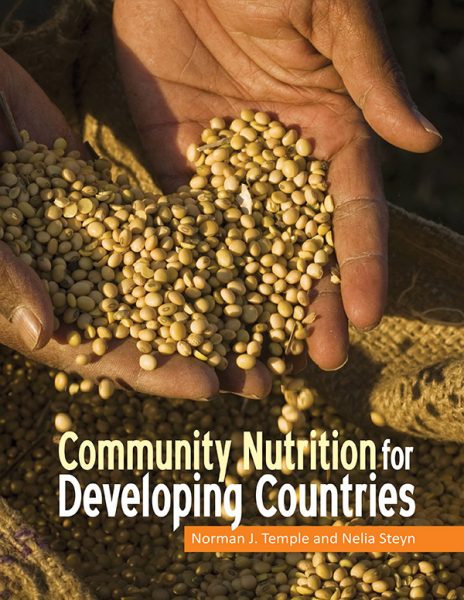A co-publication with Unisa Press
Nutrition textbooks used by universities and colleges in developing countries have very often been written by scholars who live and work in North America or the United Kingdom. And while the research and information they present is sound, the nutrition-related health challenges with which developing countries must grapple differ considerably from those found in highly industrialized Western nations. The primary aim of Community Nutrition for Developing Countries is to provide a book that meets the needs of nutritionists and other health professionals living and working in developing countries. Written by both scholars and practitioners, the volume draws on their wealth of knowledge, experience, and understanding of nutrition in developing countries to provide nutrition professionals with all the information they require. Each chapter addresses a specific nutrition challenge currently faced by developing countries such as food security, food safety, disease prevention, maternal health, and effective nutrition policy. In addition, the volume serves as an invaluable resource for those developing and implementing nutrition education programmes. With an emphasis on nutritional education as a means to prevent disease and effectively manage health disorders, it is the hope of the nearly three dozen contributors to this work that it will enhance the health and well-being of low-income populations throughout the world.
About the Editors
Norman J. Temple, professor of nutrition at Athabasca University and has published more than 60 papers, predominantly in the area of nutrition as it relates to health, and has published more than a dozen books. Currently, he is conducting collaborative research in Cape Town on the role of the changing diet in South Africa and the pattern of chronic diseases in South Africa. Nelia Steyn, lives and works in South Africa. She is a senior lecturer in the Division of Human Nutrition at the University of Cape Town and has served as a consultant for the World Health Organization and the Food and Agriculture Organization of the United Nations.
Table of Contents
- Foreword / Frits Pannekoek
- Preface
- Introduction
- PART I. The Food and Nutrition Situation in Developing Countries
- 1. A Human Rights–Based Approach to Community and Public Nutrition: Theoretical Underpinnings and Evolving Experiences / Wenche Barth Eide and Eleni M. W. Maunder
- 2. Food Security, Dietary Diversity, and Biodiversity: Food and Nutrition Security in Developing Countries
Mieke Faber and Friede Wenhold
- 3. Food Cultures / Folake Samuel and Neelam Makhani
- 4. The Nutrition Transition in Developing Countries / H. H. Esté Vorster and Lesley T. Bourne
- PART II. Lifecycle Nutrition
- 5. Nutrition During the First Thousand Days of Life, Part I: Pregnancy and Lactation / Lisanne M. du Plessis and Celeste E. Naude
- 6. Nutrition During the First Thousand Days of Life, Part II: Infant Feeding and Development / Lisanne M. du Plessis, Celeste E. Naude, and Rina Swart
- 7. Nutrition for School-age Children: Assessment, Analysis, and Action / Friede Wenhold, Ellen Muehlhoff, and H. Salome Kruger
- 8. Nutrient Requirements and Factors Affecting Nutritional Status in Older Adults / Karen E. Charlton, Monica Ferreira, and Jean M. Fourie
- PART III. The Role of Nutrition in the Prevention and Treatment of Disease
- 9. Nutritional Management of Multiple Nutrient Deficiencies / Michael K. Hendricks, H. Salome Kruger, and Thandi Puoane
- 10. Nutritional Management of HIV/AIDS, TB, and Other Infectious Diseases / Celeste E. Naude, Lisanne M. du Plessis, and Michael K. Hendricks
- 11. Nutritional Management of Diarrhoea / Joy Fraser and Alice N. Brako
- 12. Nutritional Management of Chronic Diseases / Renée Blaauw, Martani J. Lombard, Nelia Steyn, and Petro Wolmarans
- 13. Nutrition and Chronic Disease: Looking at the Big Picture / Norman J. Temple
- PART IV. From Food Guides to Nutrition Education
- 14. Dietary Recommendations, Food Guides, and Food Labels / Norman J. Temple and Lesley T. Bourne
- 15. Nutrition Education / Jane Sherman and Ellen Muehlhoff
- PART V. Key Components of Community-based Nutrition Programmes
- 16. Planning of Nutrition Programmes: An Outline / Jacob Setorglo and Matilda Steiner-Asiedu
- 17. Achieving Success in Community-Based Nutrition Programmes / Jacob Setorglo, Matilda Steiner-Asiedu, Thandi Puoane, David Sanders, and Kingsley K. Asare Pereko
- 18. The Evaluation of Community-based Nutrition Programmes / Oyediran Oyewole
- PART VI. Population Nutrition and the Role of Government
- 19. Barriers to Progress Towards a Healthier Diet: The Need for Government Action / Norman J. Temple
- 20. The Development of Government Policies on Food and Nutrition / Jacob Setorglo, Matilda Steiner-Asiedu, and Ahmed Adu-Oppong
- PART VII. Assessing Nutrition Status
- 21. Nutrition Surveillance / Jacob Setorglo and Matilda Steiner-Asiedu
- 22. Assessing Nutritional Status: Dietary Intake, Anthropometry, Clinical Signs and Symptoms, and Laboratory Tests / Alice N. Brako, Zandile Mchiza, and Whadi-ah Parker
- PART VIII. Food Services and Food Safety
- 23. Providing Meals in Institutional Settings / Ronette Lategan, Pontsho Malibe, and Luzette van Niekerk
- 24. Food Quality and Food Safety / Wilna H. Oldewage-Theron and Abdulkadir A. Egal
- PART IX. A Broader Perspective
- 25. The Nutrition Profession in Africa: Meeting Current and Future Challenges / Tola Atinmo and Oyediran Oyewole
- 26. The Problem of Misleading and Unscientific Information Regarding Nutrition / Norman J. Temple, Alice N. Brako, and Jacob Setorglo
- 27. Nutrition Challenges of a Changing World / Norman J. Temple, Megan Jamieson, and George Winter
- APPENDIX I. Sources of Reliable Information on Nutrition
- APPENDIX II. Aids to Calculations
- APPENDIX III. Dietary Reference Intakes (DRI)
- List of Contributors
This work is licensed under a Creative Commons License (CC BY-NC-ND 4.0). It may be reproduced for non-commercial purposes, provided that the original author is credited.
